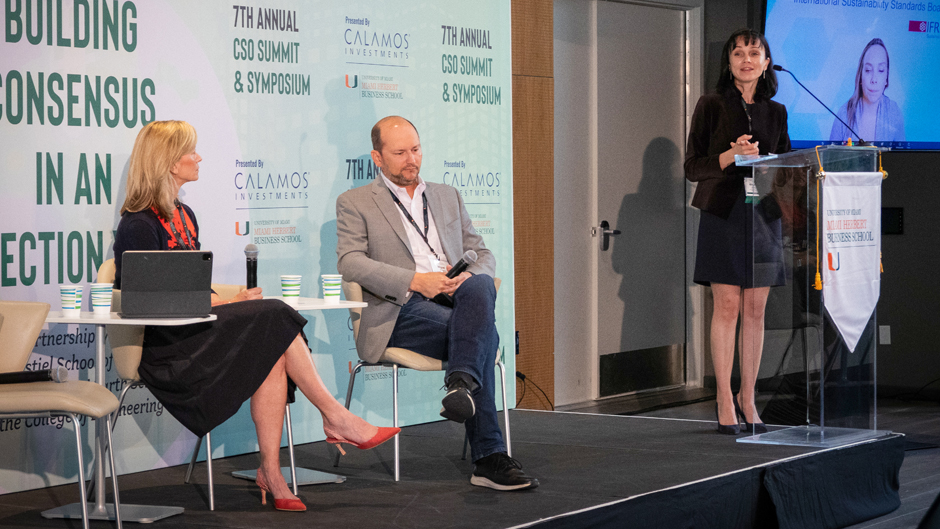Senior executives, sustainability professionals, investment managers, policymakers, community leaders, researchers, and students gathered April 5 for the Chief Sustainability Officer Summit and Symposium to assess how the increasing focus on sustainability and environmental, social and governance (ESG) is impacting business sectors from real estate to finance.
The 7th annual conference, themed “Building Consensus in an Election Year,” was hosted by the University of Miami Patti and Allan Herbert Business School’s Department of Economics and presented by Calamos Investments, in partnership with the College of Engineering and the Rosenstiel School of Marine, Atmospheric, and Earth Science.
Khrystyna Bochkay, associate professor of accounting with the business school, moderated the opening panel that explored the complicated process to generate global standards to score ESG, a framework that has evolved over the past two decades that screens investments based on corporate policies and encourages companies to act responsibly.
Elizabeth Seeger, a board member of the International Sustainability Standards Board (ISSB), noted that the ISSB is seeking to build a global baseline of disclosures and a common language for making comparable, decision-useful disclosures. Yet currently, thousands of companies across dozens of global markets are using a range of standards.
“While in this transition stage, moving from voluntary to mandatory reporting, there’s an alphabet soup of standards,” Seeger said. “The gold-plated standard isn’t there yet. It’s been a long journey.”
Andrea Heuson, a finance professor and director of the business school’s real estate programs, moderated the session on “Real Estate-Climate and Affordability.” Heusen challenged panelists to identify both obstacles and exciting developments related to environmental, social, and governance considerations.
“We’re at an exciting moment with lots of technology innovations emerging from research that can help with the building environment,” said Esber Andiroglu, an associate professor of practice in the Department of Civil, Architectural and Environmental Engineering in the College of Engineering and with a secondary appointment at the School of Architecture. “The integration of new technology and products is helping bring conservation efforts to tangible quantifiable benefits for the end-user.”
Andiroglu noted that while there is significant government funding to advance green solutions, the absence of clear regulations creates challenges.
“The opportunities are there, the products are there, and the regulatory framework is constantly evolving,” Andiroglu said. “Industry and training are not advancing at the same pace and outcomes sometimes tend to backfire—education is critical and training the workforce is a big component. The incentives need to be paired up.”
Erin Meezen, chief sustainability officer with JLL, a global flooring manufacturer and sustainability pioneer, participated on several of the panels. Meezen celebrated how awareness and acceptance for ESG has evolved in past years.
“It’s gratifying to be in this moment now, to see the things that are happening. Now we have loads of opportunity to engage in conversation with investors on these issues—it’s been a sea change since when I started as a sustainable business advisor,” Meezen said.
While ESG continues to gain acceptance in Europe and elsewhere around the world, Meezen noted the polarized political climate in the United States where 18 states have passed anti-ESG laws while six have enacted pro-ESG laws.
“ESG is essentially about improving human well-being within the biocapacity limits of our planet. It’s important to separate short-term political from long-term fiduciary and superior financial returns,” she said.
Matt Diguiseppe, a managing director with PwC’s Governance Insights Center, suggested that supporters and critics of ESG should both return to the fundamental concept that there’s more to evaluation and sustainability and the long-term nature of an organization than what shows up in the financial statements.
“We need more information and more understanding about how a company is valued and how it’s going to deliver long-term value creation,” Diguiseppe said. “We use ESG as a monitor because it moves the entire market. The fact that we’re here and have been here for seven years means that we have changed the dialogue in the market around how we understand the value that companies will create over the long-term.”

